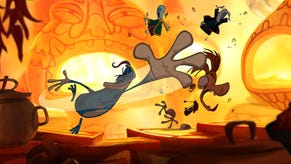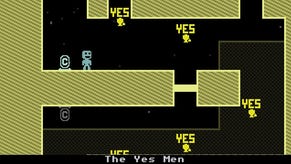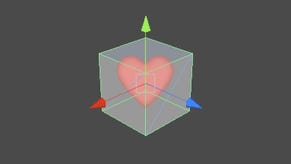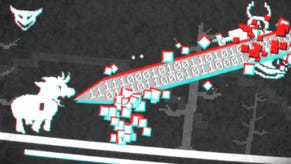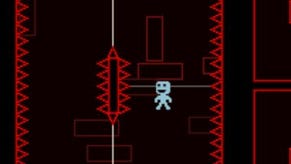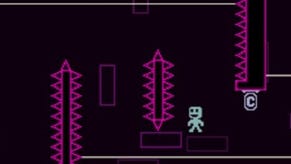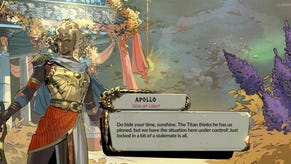Wot I Think: VVVVVV
VVVVVV is the year's first controversial Indie talking point. Soon, everyone will have an opinion. Too difficult? Too short? Or just too wonderful? I take my time to sit down and play distractionware's first real commercial game and tell you Wot I Think...
After playing VVVVVV for a little while, the power of prophecy gripped me. I became aware that during the next year or two, Terry Cavanagh will be approached in a bar by someone unknown to him. Possibly an industry function, possibly in a more general setting – I can't be sure of the time or place. But this conversation is going to happen:
“Are you Terry Cavanagh?”
“...yeah.”
"As in, VVVVVV Terry Cavanagh?”
“...yeah”.
And then they'll punch him in the face.
“That's for Veni, Vidi, Vici, you bastard.”
And Terry will deserve it. As he, in a very real way, totally asked for it.
He'll get punched by journalists for calling the game VVVVVV too, but that's a different story. You should have seen what happened to the guys from S.T.A.L.K.E.R. when we caught up with them. The reason why they haven't been any good since the first game was because we broke all their fingers and they have to code via dictation.
Anyway, VVVVVV is the first great Indie game of the year. It's a takes a squint-eyed C64/Spectrum aesthetic – as in, it only looks like you may remember these games looking like – and applies it to a puzzle platform game. The controls are elegantly minimalistic, limited to left, right and flip-gravity. As in, press a button, you fly to the ceiling. Press it again, and you fall to the floor. You're only able to flip while touching a surface, so you can't use it to fly, but you can maneuverer mid-leap. In fact, you'll get stuck about four screens in if you don't. The game basically consists of a determined examination of what you can do with such simple ingredients, with variety added by altering the environments you pass through.
It brings to mind Jet Set Willy – that is, the pixel-perfect platforming of Manic Miner, expanded into one of the first explorable platform worlds. It's an impression it tries its best to cultivate – each screen bears its own title, automatically creating its own playful mythology – but I think it'd have felt so anyway. While there's eight basically linear “level” sections, they're connected by a sprawling open world. The game creates its own context and – in a really odd way – actually creates a sense of place. When you're careening crazily with freedom across the open sections I even found myself thinking of Exile. That at least partially comes from the set up – a crashed ship with five of the crew lost. Your missions is to find them, though there's also twenty device-shiny-globby things to collect too. Ah, the lure of the shiny blob. When will we learn to resist its siren call?
A few words on the aesthetic and its effect on the game. For example, while it has a plot, it's light, and sells it lightly. Characters have two facial expressions. They're either perma-beam or sad-face, a limited emotional expression which the game uses well enough to get me to go “awww!” at least a couple of times. As a whole, it's very cute, very likeable and very human. And as a lead, the captain is a total hero. We should all be more like him. He's either totally gleeful, unless he dies, and then there's sad face.
So he sad faces a lot.
It's a game that's often nightmarishly hard. But – key point – it mitigates it brilliantly, and shows that hardness alone isn't actually the problem. It helps that it mixes it up, and is hard in many different ways. Sometimes it's Braid-esque puzzles. However, unlike Braid, it also leans heavily on actual physical performance. There's often cleverer ways around than the straight route, yes. But not always. Not even mostly. It's just you and your reflexes versus a game.
Which leads us to Veni, Vidi, Vici.
Let's show you Veni, Vidi, Vici.
A couple of points. Firstly, it's an atypical puzzle in the game – there's nowhere else you do something that mental. But the game is full of atypical puzzles. That's it's strength, that it fucks you over in a variety of imaginative ways. Secondly, that this is footage from the Beta version. There's considerably more spikes in the full game. As in, this is easier.
When I started playing this I found myself in the RPS chat room, writing lurid disturbing metaphors involving skydiving down the vagina-dentate of Mrs Godzilla, having to land on the trampoline at the bottom and bounce out of the top. That was at the start. A few hundred lives later, I'm in close to a mediative state.
Basically, you fly too fast to react, so you have learn. This is trial and error, a classic design error. This doesn't matter, for reasons I'll get into in a bit. But it's primarily about physical performance, getting the bloody thing into your muscle memory. As a puzzle, when I played it my best, I was in that distant zone, brain close to elsewhere, thoughts coming to me unhindered on the nature of design, difficulty, human nature. One hit me, with an odd tranquil profundity.
“Humanity can endure anything but unfairness”
According to what I've read, the unhappiest nations on Earth aren't the ones with the lowest level of poverty – but the ones with greatest difference in poverty, married to the belief that those without success are worthless. Then there's the study – which I paraphrase badly – based around two people, not in line sight of one another. One is given stuff. They have to give a percentage of the stuff to the other person. The other person can either accept it or reject it, with the other person being told whether their division has been accepted or rejected. A clear majority of people will reject it once it gets gets to that 80-85% point. It's an unfair greedy deal, and they'll have no truck with it. Even if you make the test totally blind, and the person who's making the offer isn't told whether or not the person rejects it – so removing the aspect of social censure (“I will have nothing to do with you”) - about half of people will always reject social offers. The reporting around the paper put it at some kind of stupidity – this is free stuff, after all, and getting anything is better than getting nothing. But I thought it as wonderful evidence how much we're wired to despise unfairness. The rejection is about me not wanting anything to do with the openly corrupt system. A game which is unfair will lose all but the most masochistic in seconds.
And Veni, Vidi, Vici, for all its epic brutality, wasn't unfair. It was just what it was. And I was willing to accept that. We're wired to reject unfairness. Simultaneously, at least some of us, are wired for Sisyphean stoicism.
All that came to me, as I flew through Mrs' Godzilla's vicious private parts, in a moment.
At which point I completed the level and was reduced to disturbingly orgasmic cries. I haven't felt as good with a videogame, in that direct physical way, for quite a while.
Veni, Vidi, Vici – and VVVVVV as a whole – works for a couple of reasons. Firstly, it strips any non-challenge related problems. There's no lives. The game is divided into distinct challenges, with a checkpoint at the start. There's virtually no replaying shit bits to get to the actual problem. You just make an attempt, instant fail, instant re-set. The best comparison I have is Trials 2. Death, instant re-set, try again. That's why trial and error isn't a problem. Like Trials 2, each go is a micro experiment, to see what results of a decision are. You aren't punished for playing.
Frustration isn't difficulty. Frustration is difficulty cut with boredom. The design of VVVVVV does everything it can to avoid you being bored. It removes all bullshit forms of making a bit difficult, in favour of just making it difficult. It maintains accessibility and the possibility of small play sessions – you can save anywhere – while actually still allowing the feeling of achievement when overcoming a tricky situation or unraveling an awkward puzzle. Hell – even the lightning speed of the character minimises the down-time in a challenge.
Secondly, I didn't have to do it. While there's definitely violently awkward bits on the main route of the game, Veni, Vidi, Vici is for one of the twenty-optional pick-ups. I could have given up and gone and worked on another part of the game. The overland is full of teleports which you can skip between. You can go back to your ship at any point. This bit too hard? Go do something else.
In short, VVVVVV does everything it can to make the game as easy as possible. Except the game.
Which, if you're going to make a grotesquely difficult game like this, is the way to do it.
My reservations are few, mainly where the few minor places where it fails in its aims –for example, a teleporter an inch further away from the actual challenge, leading to a dead half-second before actually doing something meaningful. The bigger one is the length of the game. I'd reject the couple of hours which some people are flying around, unless you're atypically good – in which case, well done you. Took me three and a half, which puts it alongside Portal - but I'm atypically shit. Especially because I didn't really complete it –I got just over half of the collectable items, meaning there's a good chunk of the game's most difficult puzzles that haven't been touched. If you actually look at what the people who claim to have completed it in two hours have achieved, you'll find – at least as far as I've seen - they've done likewise.
The are extra stuff in the game – a flip mode, time trials in each of the levels and even for the terminally mental a one-life mode - so plenty of stuff to play. And – because a greater chunk of the experience is based around performance rather than pure puzzling – I'd say it was considerably more replayable than (to choose a relevant example) Braid.
That said, while I think it is worth the money, fifteen dollars (aka just less than 10 quid) does strike you as a lot for an Indie lo-fi platformer. Which, really, makes me wonder whether our priorities have got tangled somewhere. Without inflation, this is the price you'd pay for one of the Ultimate games back in the day. This is at least as good as any of the Ultimate games, and a novel, new and glorious thing. I'm sure it'll be on sale later – tactically speaking, launching at a relatively higher price and then cutting is good practice. And I also wonder whether launching at much less shows a worrying lack of self respect. If you don't pretend you're worth anything, no-one will ever treat you like it. Like, obv.
So whether you want to pay now or wait to see if it's ever cheaper, I advise you to play the thing. In some ways, it's a surprising first commercial game for Cavanagh. His indie work like Judith and Don't Look Back are portentous, borderline art-pieces (in “In an art gallery”) way. This isn't. It is, to use Indie game shorthand, more World of Goo than Braid. It's a fine pop single, full of yelps and excitements, to fill you with yelps (of pain and pleasure) and excitements. It's a brilliant way to start the gaming year, making you flick the developer the Vs as he does a V for victory straight back at you.
He will be punched though. Mark my words.
The demos can be downloaded here, and is available as a webgame here (Though I'd download it so you get the "real" performance). The full thing can be bought here.








